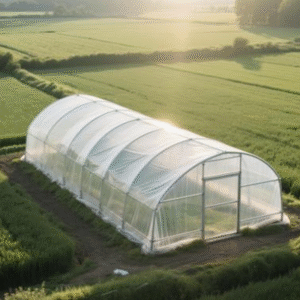Introduction
The current weather is unpredictable, plants and vegetables cannot obtain a good growing environment. However, greenhouses can precisely solve this problem. Nowadays, people’s incomes are getting higher and higher. They are willing to spend money on themselves, buy consumer goods, go out to play and so on. They pay more attention to the quality of life. Therefore, they are also willing to put in effort in gardening. Not only is the market for greenhouses getting larger and larger, but the types are also increasing, which can meet the demands of most markets. Residential greenhouses allow people to enjoy the pleasure of doing things by themselves while getting the freshest fruits and vegetables. Commercial greenhouses can increase the growth rate of plants and improve profit margins. In this blog, we will talk about the steps when importing the greenhouse.

Table of Contents
Why Import Greenhouses for Your B2B Business?
- High-return investment
Steel greenhouse pipe and greenhouse plastic costs are usually stable, which allows for forecasting and price stability. Great margins and returning customers make the profits very considerable, at least three times as much. The cost difference of large-scale production and modular production make the cost per square meter lower. In the international greenhouse manufacturing industry, China, relying on the cluster effect of industries, has relatively low raw material procurement costs.
- After the greenhouse is imported to your own country, you can sell components or offer your own services, such as on-site installation……
Helping customers install on-site is different from other greenhouse merchants. However, the labor cost for on-site installation also comes with expenses. Therefore, if the greenhouses are imported from other places, the profit margin can be greatly increased.
- Reducing costs compared with purchasing from local manufacturers
Partner with suppliers in countries like China, Vietnam,India,Mexico for lower lobar and production costs. From greenhouse materials to packaging, all manufacturing stages happen in a limited area close to seaport. This drastically reduces logistics costs and carbon footprint.
Steps for Importing Greenhouses
Step 1: Research well-known greenhouse suppliers
Give priority to companies that only do greenhouse B2B business because they have more rich experience. Find out if they have certificates, such as basic ones like ISO and CE. If they have a platform, you can also take a look at the reviews.
Step 2: Verify Compliance & Documentation
In international trade, customs is an indispensable presence. To avoid customs delays caused by non-compliance with regulations, the following points should be noted:
-Check the local import regulation,such as USDA in the US, EU Directives…
-Essential documents such as Commercial invoice, Packing list, Bill of lading, Certificate of origin
Step 3:Plan Logistics & Shipping
Choose the mode of transportation based on the urgency of the goods or the budget.
-Sea Freight:Cost-effective for large orders (20ft or 40ft containers).
-Air Freight:Faster but more expensive
Use trade clause(such as FOB, CIF…) to clarify responsibilities between you and the import supplier. Purchasing cargo insurance to protect against damage is also important.
Step 4:Clear Customs Efficiently
Submit accurate documents and materials and pay taxes in a timely manner. If you are cooperating with a customs declaration company, it is necessary to ensure timely communication among the three parties
Some Cost-Saving Tips for B2B Buyers
- Bulk discounts
Negotiate lower rates for larger orders when bulk purchase. Suppliers usually offer discounts to bulk buyers. The greater the quantity purchased, the greater the discount. Therefore, for best-selling products, a large quantity can be purchased at one time to reduce costs
- Optimize Supplier Relationships
Reduce the number of suppliers to build long-term partnerships, foster loyalty for preferential rates and priority service.
- Inventory Management
Minimize holding costs by aligning inventory with production needs. Meanwhile, use data analysis to avoid overstocking and reduce waste. Learn the solution to avoid dead stock, please read our blog “End-of-Season Sale for Greenhouse Kit”.
- Consolidate Shipments
Combine orders to reduce freight costs.
- Review Contracts Regularly
Monitor contract terms to prevent unexpected rate hikes and secure better terms before contracts expire.
- Outsourcing Non-core Functions
It can enable non-core businesses such as logistics to be handled by third professional parties, thereby enhancing efficiency.
- Monitor Market Trends
Greenhouse products are often used in winter, so they can be purchased during the off-season of summer, which can effectively reduce procurement costs
Why Partner with Professional Greenhouse Suppliers?
- Expertise and Knowledge
B2B supplier offer end-to-end logistics support and they are more familiar with transaction process, thus they could deal with emergencies more flexibly. They provide tailored solutions based on your specific needs(climate,crop type and scale)
- Quality and Durability
Professional suppliers usually use high-quality materials(UV-resistant film, galvanized steel tube…)to ensure the quality of their products and their reputation. Because of its good quality, the maintenance cost is low. Besides, they can provide warranties and after-sales service.
- Ongoing Support
They provide warranties and after-sale services, help customers to ensure the best condition of the greenhouse.
- Regulatory Compliance
They ensure compliance with global trade laws. They help permit assistance by navigate local building codes,zoning laws, and environmental regulations. Ensure structures meet safety requirements.

Conclusion
Professional greenhouse suppliers provide value to customers with their expertise, high-quality products and long-term support. This cooperative relationship can ensure that your greenhouse project develops efficiently, sustainably and scalably. By following this greenhouse import guide, your greenhouse B2B business can minimize risks, maximize savings, and secure reliable B2B greenhouse suppliers.
